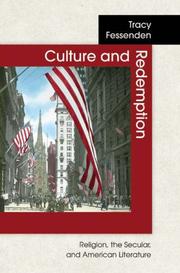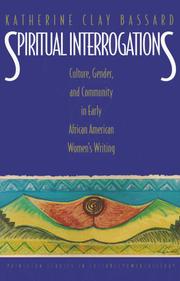| Listing 1 - 3 of 3 |
Sort by
|

ISBN: 0691049637 9780691049632 0691049645 1283137445 9786613137449 1400837308 Year: 2007 Publisher: Princeton: Princeton university press,
Abstract | Keywords | Export | Availability | Bookmark
 Loading...
Loading...Choose an application
- Reference Manager
- EndNote
- RefWorks (Direct export to RefWorks)
Many Americans wish to believe that the United States, founded in religious tolerance, has gradually and naturally established a secular public sphere that is equally tolerant of all religions — or none. Culture and Redemption suggests otherwise. Tracy Fessenden contends that the uneven separation of church and state in America, far from safeguarding an arena for democratic flourishing, has functioned instead to promote particular forms of religious possibility while containing, suppressing, or excluding others. At a moment when questions about the appropriate role of religion in public life have become trenchant as never before, Culture and Redemption radically challenges conventional depictions — celebratory or damning — of America’s “secular” public sphere.Examining American legal cases, children’s books, sermons, and polemics together with popular and classic works of literature from the seventeenth to the twentieth centuries, Culture and Redemption shows how the vaunted secularization of American culture proceeds not as an inevitable by-product of modernity, but instead through concerted attempts to render dominant forms of Protestant identity continuous with democratic, civil identity. Fessenden shows this process to be thoroughly implicated, moreover, in practices of often-violent exclusion that go to the making of national culture: Indian removals, forced acculturations of religious and other minorities, internal and external colonizations, and exacting constructions of sex and gender. Her new readings of Emerson, Whitman, Melville, Stowe, Twain, Gilman, Fitzgerald, and others who address themselves to these dynamics in intricate and often unexpected ways advance a major reinterpretation of American writing
American literature --- Christianity and culture --- Religion and literature --- Secularism --- History and criticism. --- United States --- Church history. --- History and criticism --- Church history --- Secularism - United States --- Christianity and culture - United States --- American literature - History and criticism --- Religion and literature - United States --- United States - Church history
Book
ISBN: 1400834910 128256935X 0691135088 069114575X 9781400834914 9780691135083 9780691145754 9780691135083 9780691145754 9781282569355 Year: 2010 Publisher: Princeton Princeton University Press
Abstract | Keywords | Export | Availability | Bookmark
 Loading...
Loading...Choose an application
- Reference Manager
- EndNote
- RefWorks (Direct export to RefWorks)
How can intense religious beliefs coexist with pluralism in America today? Examining the role of the religious imagination in contemporary religious practice and in some of the best-known works of American literature from the past fifty years, Postmodern Belief shows how belief for its own sake--a belief absent of doctrine--has become an answer to pluralism in a secular age. Amy Hungerford reveals how imaginative literature and religious practices together allow novelists, poets, and critics to express the formal elements of language in transcendent terms, conferring upon words a religious value independent of meaning. Hungerford explores the work of major American writers, including Allen Ginsberg, Don DeLillo, Cormac McCarthy, Toni Morrison, and Marilynne Robinson, and links their unique visions to the religious worlds they touch. She illustrates how Ginsberg's chant-infused 1960's poetry echoes the tongue-speaking of Charismatic Christians, how DeLillo reimagines the novel and the Latin Mass, why McCarthy's prose imitates the Bible, and why Morrison's fiction needs the supernatural. Uncovering how literature and religion conceive of a world where religious belief can escape confrontations with other worldviews, Hungerford corrects recent efforts to discard the importance of belief in understanding religious life, and argues that belief in belief itself can transform secular reading and writing into a religious act. Honoring the ways in which people talk about and practice religion, Postmodern Belief highlights the claims of the religious imagination in twentieth-century American culture.
American literature - 20th century - History and criticism. --- Postmodernism (Literature). --- Religion and literature - United States - History - 20th century. --- Religion in literature. --- American literature --- Religion and literature --- Religion in literature --- Postmodernism (Literature) --- American Literature --- English --- Languages & Literatures --- History and criticism --- History --- History and criticism. --- Religion in drama --- Religion in poetry --- Literature --- Literature and religion --- Literary movements --- Literature, Modern --- Modernism (Literature) --- Post-postmodernism (Literature) --- Moral and religious aspects --- Hitos en las Literaturas Contemporáneas Inglesa y Norteamericana (70482115) --- Bibliografía recomendada

ISBN: 1282753444 9786612753442 1400822599 069101647X 1400800374 1400815045 Year: 1999 Publisher: Princeton Princeton University Press
Abstract | Keywords | Export | Availability | Bookmark
 Loading...
Loading...Choose an application
- Reference Manager
- EndNote
- RefWorks (Direct export to RefWorks)
The late eighteenth century witnessed an influx of black women to the slave-trading ports of the American Northeast. The formation of an early African American community, bound together by shared experiences and spiritual values, owed much to these women's voices. The significance of their writings would be profound for all African Americans' sense of their own identity as a people. Katherine Clay Bassard's book is the first detailed account of pre-Emancipation writings from the period of 1760 to 1863, in light of a developing African American religious culture and emerging free black communities. Her study--which examines the relationship among race, culture, and community--focuses on four women: the poet Phillis Wheatley and poet and essayist Ann Plato, both Congregationalists; and the itinerant preacher Jarena Lee, and Shaker eldress Rebecca Cox Jackson, who, with Lee, had connections with African Methodism. Together, these women drew on what Bassard calls a "spirituals matrix," which transformed existing literary genres to accommodate the spiritual music and sacred rituals tied to the African diaspora. Bassard's important illumination of these writers resurrects their path-breaking work. They were cocreators, with all black women who followed, of African American intellectual life.
African American women -- Intellectual life. --- African American women -- Religious life. --- African American women in literature. --- American literature -- 19th century -- History and criticism. --- American literature -- African American authors -- History and criticism. --- American literature -- Women authors -- History and criticism. --- Christianity and literature -- United States. --- Community life in literature. --- Religion and literature -- United States. --- Spiritual life in literature. --- Spirituals (Songs) -- History and criticism. --- Wheatley, Phillis, 1753-1784 -- Religion. --- Women and literature -- United States.
| Listing 1 - 3 of 3 |
Sort by
|

 Search
Search Feedback
Feedback About UniCat
About UniCat  Help
Help News
News